Baijiu, China’s national liquor, is notoriously difficult for foreigners to stomach. And yet, Bill Isler has made a career of getting waiguoren to do just that. In 2014, Isler and friends started the world’s firstever baijiu bar, Capital Spirits, ‘as a hobby’ – as of today, the bar has been featured in Lonely Planet guides and The New York Times.
Now, Isler and his partners are taking their baijiu magic abroad. With famed Sichuanese distillery Luzhou Laojiao, they’ve created Ming River, a new baijiu specially made for Western markets. We caught up with Isler, now based in New York and the CEO of the new company, to learn more.
That's: How did Ming River get started?
BI: When we opened Capital Spirits, everybody
told us we were going to go out of business.
But somehow we got media attention, and
when Chinese distilleries saw the stories,
they began to fly people to Beijing to meet
with us.
We weren’t thinking about the timing when we opened Capital Spirits, but 2014 was the real nadir of the baijiu industry because of the government crackdown on public spending and corruption. [Editor’s note: Expensive baijius were once a popular gift for Chinese officials.] Revenues were down 50 to 75 percent across the industry. So right at this time when the industry was really suffering, distilleries saw these Westerners who had this place in Beijing where foreigners were willingly going to drink baijiu and pay for it. So they asked, can you help us?
We told them no! We told everybody, hey, thanks for coming, but this is just a hobby for us. But after seven or eight groups of these managers from distilleries came to us, we said, you know, maybe we can change our answer from ‘no’ to ‘maybe, if the price is right.’ We spoke to several different distilleries, and [Sichuan baijiu maker] Luzhou Laojiao had the most similar idea of how baijiu could succeed abroad.
Luzhou Laojiao is one of the most known
baijiu producers in China. What is the
distillery in Sichuan like?
If you go up the Yangtze from Chongqing,
you come to Luzhou. It’s a small city by
Chinese standards, and the core industry is
baijiu. Luzhou Laojiao employs thousands of
people and they make millions and millions
of bottles.
The river is how Luzhou’s baijiu spread to the rest of China. There were no roads in that part of China because it’s very mountainous, so the Yangtze was the only way in and out, and Luzhou is at its highest navigable point. Strong-aroma baijiu can be found all along the Yangtze river, and it started in Luzhou. They’ve been making baijiu there since the year 1573, but that’s just their oldest continuous production of specific fermentation pits – they were making baijiu there before then, too.
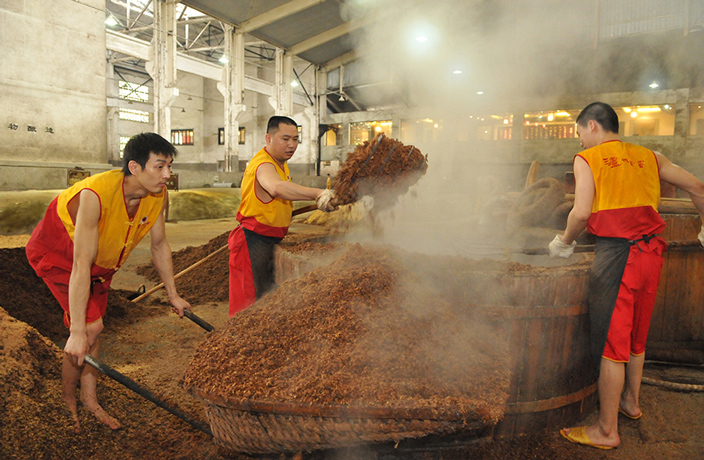
How did you work with Luzhou Laojiao to
make a baijiu for Western tastes?
Everything in the bottle is made by Luzhou
Laojiao according to traditional methods,
but this particular blend of distillates was
developed by a team of bartenders in New
York.
We brought a wide range of distillates from Luzhou to New York, and gave them to a team of bartenders. We did four rounds of revision. We did blind tastings and blendings, and then figured out different ratios of what worked best. Then we would send that back to China with feedback like, ‘We want something that’s little bit more peppery,’ or ‘Can you give us something with less anise note to it?’ Each time we did this, we’d get closer to something that we thought really worked.
Who were these tasters in New York?
Had they had baijiu before?
All of them are highly regarded bartenders
in New York, and the team was arranged
by Don Lee, who was the head bartender at
[renowned NYC cocktail bar] PDT, and then
the beverage director for Momofuku. We
had people tasting from [well-known New
York bars] NoMad, Death & Co, and the current
PDT team.


Because these people are very educated
in spirits, each of them had had some exposure
to baijiu. But most people in the
US who have any idea about baijiu think
they’re all roughly the same – so the most
interesting thing is that all of them said this
one is quite different from what they’d had
before. Most of them had had either Maotai
or Erguotou, which are two different ends of
a spectrum of what baijiu can be. We’re very
different from either one.
What does Ming River taste like?
Tropical fruit. The very long solid-state
fermentation process [in which blocks of
sorghum are left in pits to ferment as solids] releases esters that you don’t normally get
in grain-based spirits, so the most common
flavor compound in it is actually ethyl hexanoate,
which is most commonly found in
pineapple. The main flavor notes are tropical
fruits, and then anise and white pepper,
with a slight cheesy funk to it as well.
It has a very complex flavor and aroma
for just sorghum-based baijiu – there are no
different ingredients in it. It’s just a flavor
that naturally developed throughout the
fermentation process.
So unlike [some other distilleries], Luzhou Laojiao is not using a blend of grains – it’s all sorghum.
How are you able to alter the character of
the taste so dramatically then?
All of Luzhou Laojiao’s baijius are produced
in the same way, but each individual
fermentation pit will take on its own
character over time. The flavor then
depends on how long the spirits are aged
for, which point in the distillation process
they’re moved out of the pits [and which
pits the baijius come from]. So all baijius
are blends of... baijiu.
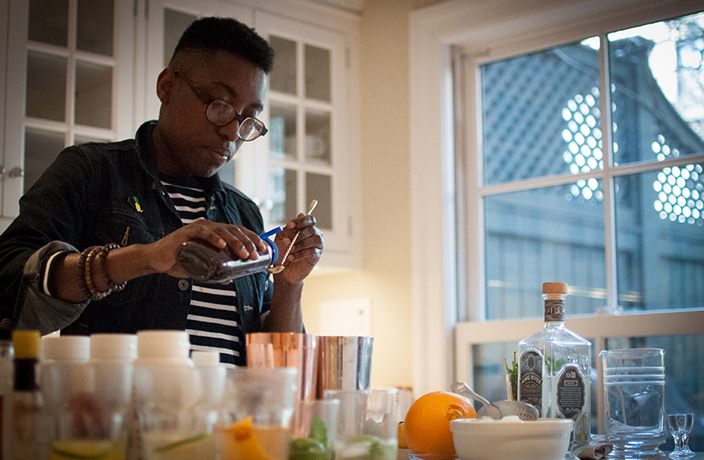
What is your goal for Ming River?
We are trying to build a brand, but more
importantly, we’re also trying to make
baijiu a recognized category of spirits. The
majority of what we’re doing is educating
people about baijiu. We’re doing master
classes with Derek Sandhaus [one of Ming
River’s partners and the author of Baijiu:
The Essential Guide to Chinese Spirits] –
he speaks about the history of alcohol in
China, how baijiu came to be and the different
styles. And whenever we do tastings
for consumers or bartenders, we still bring
out other baijiu as well. Ming River is just
one point on a broad spectrum of baijiu,
and I want people to understand the
category in all its diversity.
You’re all Americans, selling baijiu. How can
you honor Chinese culture without
appropriating it?
We never said we discovered baijiu. We
always say we’re very lucky to work with
people [from a company that's] been making
baijiu for over 400 years, and that we’re
uniquely positioned to act as a bridge between
them and the people who we’re talking
to. We all lived in China for a long time,
and we all worked with baijiu before. We’re
very careful to never claim ownership of
it. I say we’re fortunate to take something
that’s been around for over 400 years and
put it in a new package that fits on your
shelf.
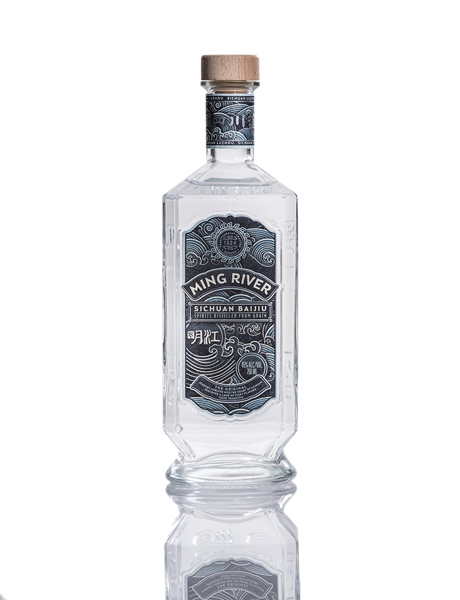
For more info, visit www.mingriver.com and www.drinkbaijiu.com.
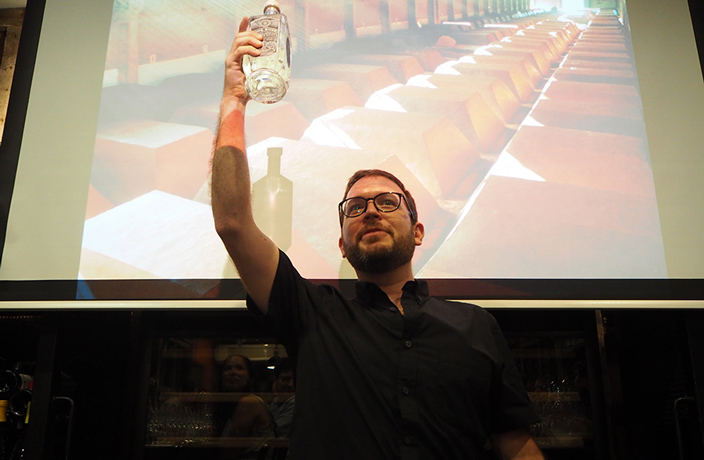






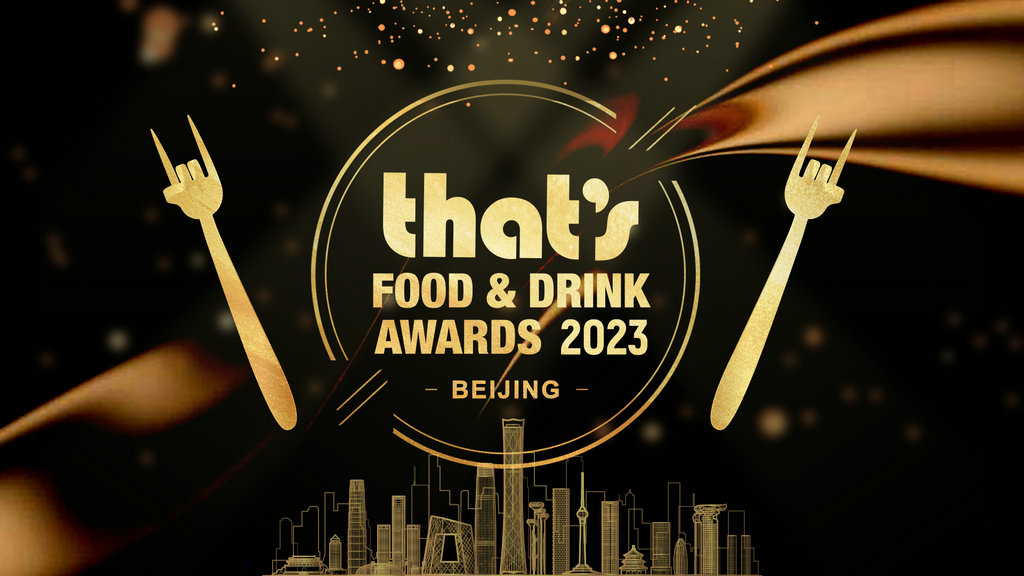














0 User Comments